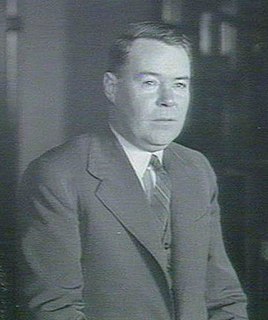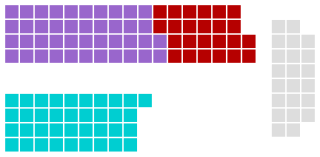Related Research Articles
Members of the New South Wales Legislative Council who served in the 54th Parliament were elected at the 1995 and 1999 elections. As members serve eight-year terms, half of the Council was elected in 1995 and did not face re-election in 1999, and the members elected in 1999 did not face re-election until 2007. The President was Virginia Chadwick.</ref>

Northern Tablelands is an electoral district of the Legislative Assembly in the Australian state of New South Wales. It is currently held by Adam Marshall representing the National Party, following a by-election triggered by the resignation of independent member Richard Torbay. The electorate currently includes Uralla Shire, Armidale Regional Council, Glen Innes Severn, Inverell Shire, Gwydir Shire and Moree Plains Shire.
Eastern Division of Camden was an electoral district for the Legislative Assembly in the then British colony of New South Wales from 1856 to 1857. Its name was changed to East Camden in January 1858, and it was largely replaced by the district of Illawarra in June 1859.
The Gwydir was an electoral district of the Legislative Assembly in the Australian state of New South Wales, created in 1859, when Liverpool Plains and Gwydir was divided, and named after and including the Gwydir River. In 1894 it was abolished and largely replaced by Moree and Barwon. It was re-created in the 1904 re-distribution of electorates following the 1903 New South Wales referendum, which required the number of members of the Legislative Assembly to be reduced from 125 to 90. It consisted of the abolished seat of Moree and part of Inverell. It was abolished in 1920, with the introduction of proportional representation and largely merged, along with Tamworth, into Namoi.

William James Scully was an Australian politician and farmer. He was a member of the Australian Labor Party (ALP) and held ministerial office in the governments of John Curtin and Ben Chifley, serving as Minister for Commerce (1941–1942), Commerce and Agriculture (1942–1946) and Vice-President of the Executive Council (1946–1949). He served in the House of Representatives from 1937 to 1949, representing the New South Wales seat of Gwydir.
Jonathan Richard O'Dea is an Australian politician and a member of the New South Wales Legislative Assembly representing Davidson for the Liberal Party since 2007.
John Fletcher Hargrave was a British-born Australian politician and judge.
Richard Hargrave was an Australian politician and a pastoralist.

Trevor John Khan, an Australian politician, is a Nationals member of the New South Wales Legislative Council and serves as Deputy President and Chair of Committees. Khan has been a member of the Council since 24 March 2007.
Richard Thomas Marshall Bull is a former Australian politician. The son of federal National Party Senator Tom Bull and his wife Jessie, he was a farmer and grazier at Narrandera and Holbrook. On 12 March 1970 he married Patricia Anne Jeffreys; they have three daughters and a son.
Geoffrey Robertson Crawford, DCM was an Australian politician. He was a member of the New South Wales Legislative Assembly for the Country Party from 1950 to 1976, and served as Minister for Agriculture from 1968 until 1975.

The third Dibbs ministry, the 27th ministry of the Colony of New South Wales, was led by Sir George Dibbs, leader of the Protectionist Party, following the 1891 New South Wales election, which saw the Labour Party win seats in the New South Wales Legislative Assembly and the balance of power. With no party having a majority, Sir Henry Parkes held on as Premier until October 1891 when he lost a vote in the Legislative Assembly, causing Parkes to resign as Premier and leader of the Free Trade Party. Dibbs formed the ministry on 23 October 1891, with Labour support, and comprised 10 ministers.

Robert Reginald Downing, AC QC was an Australian lawyer, textile worker, union organiser and politician. He was a member of the New South Wales Legislative Council for the Labor Party for 31 years from 1940 to 1972 and also served as the Attorney General, Minister for Justice and Vice-President of the Executive Council from 1941 to 1965.

A by-election was held for the New South Wales Legislative Assembly seat of Northern Tablelands on 25 May 2013. The by-election was triggered by the resignation of independent member Richard Torbay, which was announced on 20 March 2013. Adam Marshall was declared elected on 28 May 2013.

Adam John Marshall, an Australian politician, is the New South Wales Minister for Agriculture and Western New South Wales in the second Berejiklian ministry since April 2019. Marshall is a member of the New South Wales Legislative Assembly, and has represented Northern Tablelands since a 2013 by-election, as a member of The Nationals.
Cyril Joseph Cahill was an Australian politician.

The 1901 New South Wales state election was held on 3 July 1901 for all of the 125 seats in the 19th New South Wales Legislative Assembly and it was conducted in single-member constituencies with a first past the post voting system. The Parliamentary Electorates Act of 1893 had conferred the right to vote on every male British subject over 21 years of age who was resident in New South Wales for a year or more. The 19th parliament of New South Wales was dissolved on 11 June 1901 by the Governor, Lord Beauchamp, on the advice of the Premier, John See.

The Leader of the Government in the Legislative Council, known before 1 July 1966 as Representative of the Government in the Legislative Council, is an office held in New South Wales by the most senior minister in the New South Wales Legislative Council, elected to lead the governing party in the council. Though the leader in the Council does not have the power of the office of Premier, there are some parallels between the latter's status in the Legislative Assembly and the former's in the Council. This means that the leader has responsibility for all policy areas, acts as the government's principal spokesperson in the upper house and has priority in gaining recognition from the President of the Council to speak in debate.
Eastern Division of Camden, an electoral district of the Legislative Assembly in the Australian state of New South Wales was created in 1856 and abolished in 1859.
A by-election was held for the New South Wales Legislative Assembly electorate of Illawarra on 28 October 1859 because John Hargrave resigned to accept an appointment to the Legislative Council.
References
- ↑ "The Hon. Richard Hargrave Colless, HD App Sci(Agric) (1952 - )". Members of the Parliament of New South Wales . Retrieved 2 April 2019.
- 1 2 3 Richard Colless (11 October 2000). "Legislative Council Rural Assistance Amendment Bill Hansard (Extract)" (pdf). Parliamentary Debates (Hansard) . New South Wales: Legislative Council. Retrieved 19 April 2019.
- ↑ "Mr Richard Hargrave (1817-1905)". Members of the Parliament of New South Wales . Retrieved 19 April 2019.
- ↑ "Mr John Fletcher Hargrave, QC (1815-1885)". Members of the Parliament of New South Wales . Retrieved 11 March 2019.
Bennett, J M (1972). "Hargrave, John Fletcher (1815-1885)". Australian Dictionary of Biography . Melbourne University Press. ISSN 1833-7538 . Retrieved 19 April 2019– via National Centre of Biography, Australian National University.